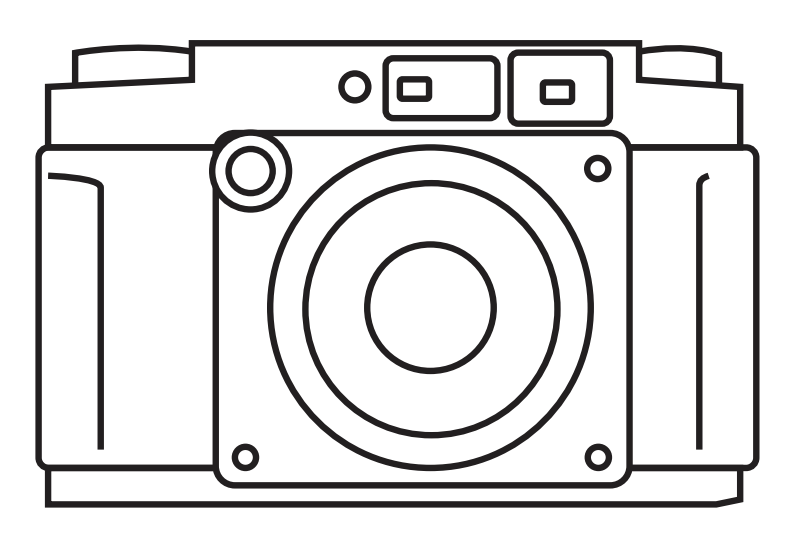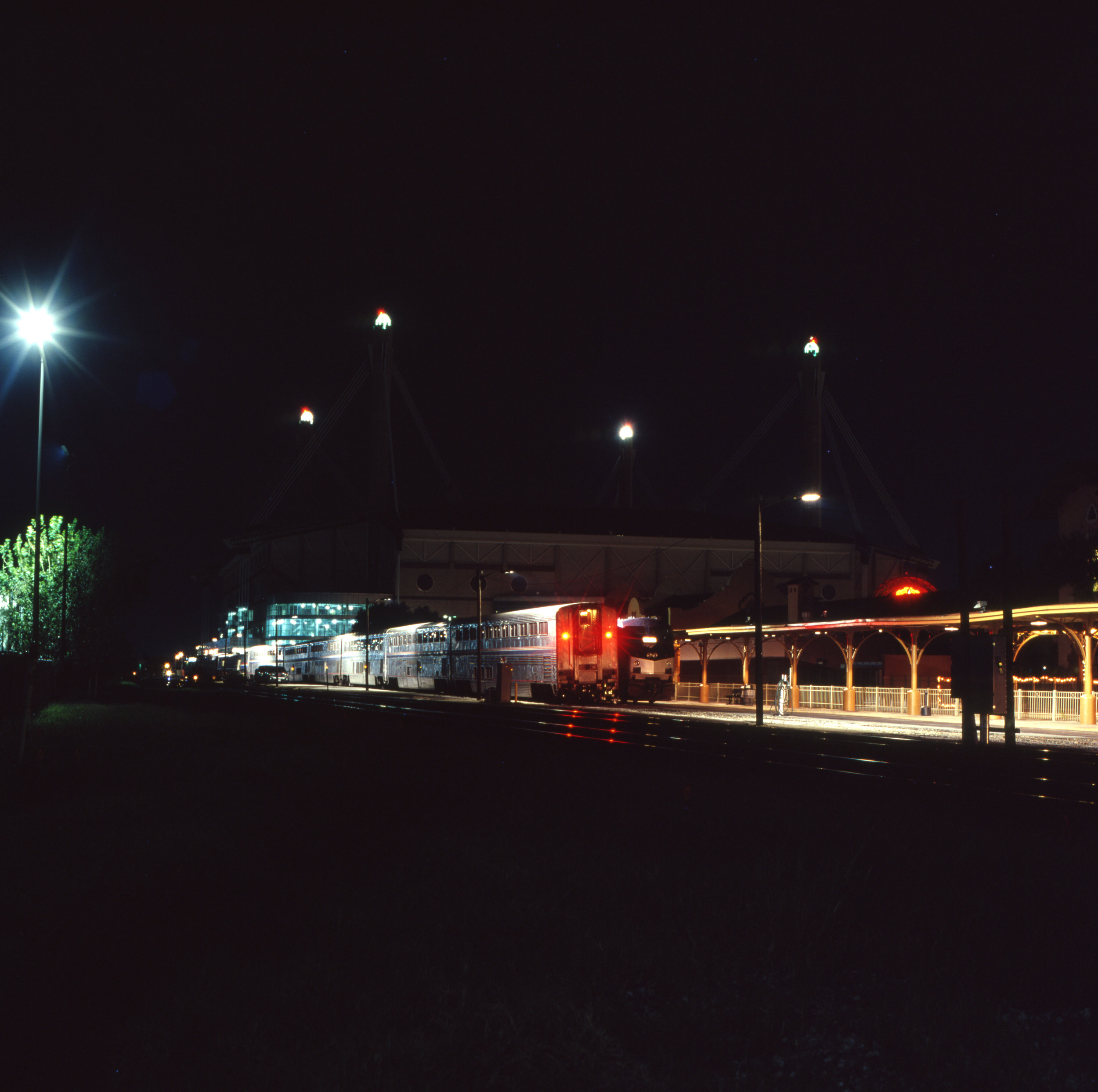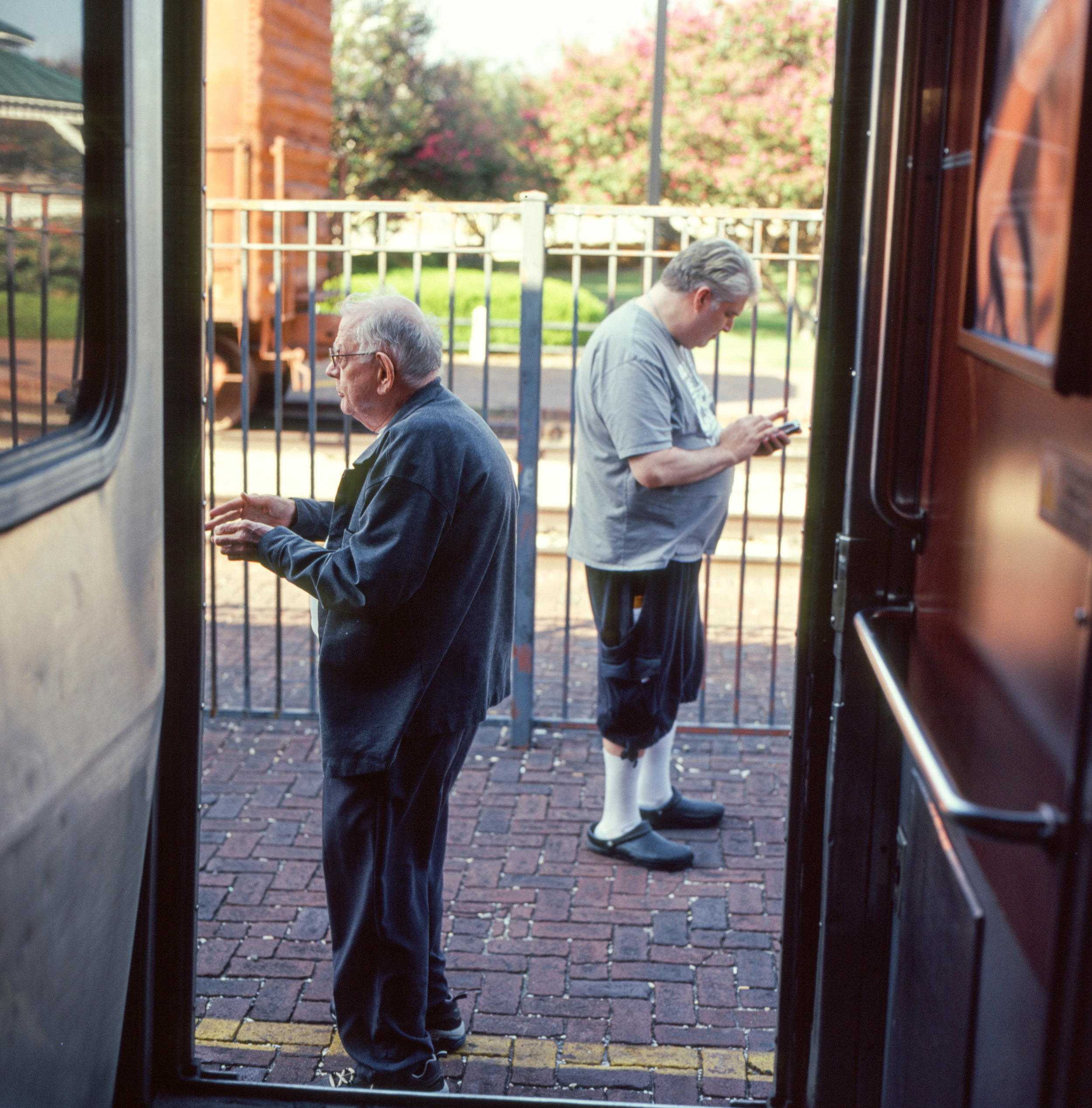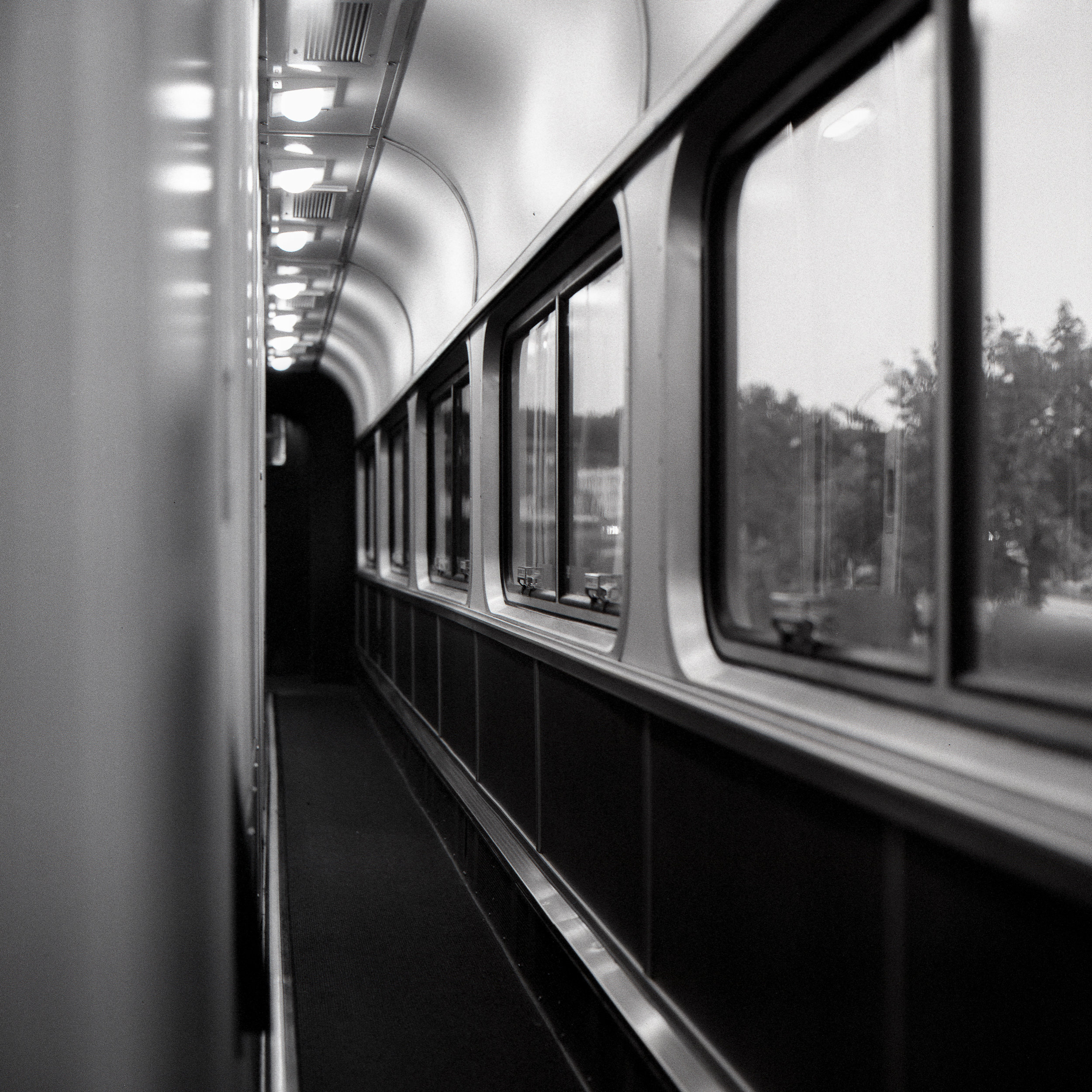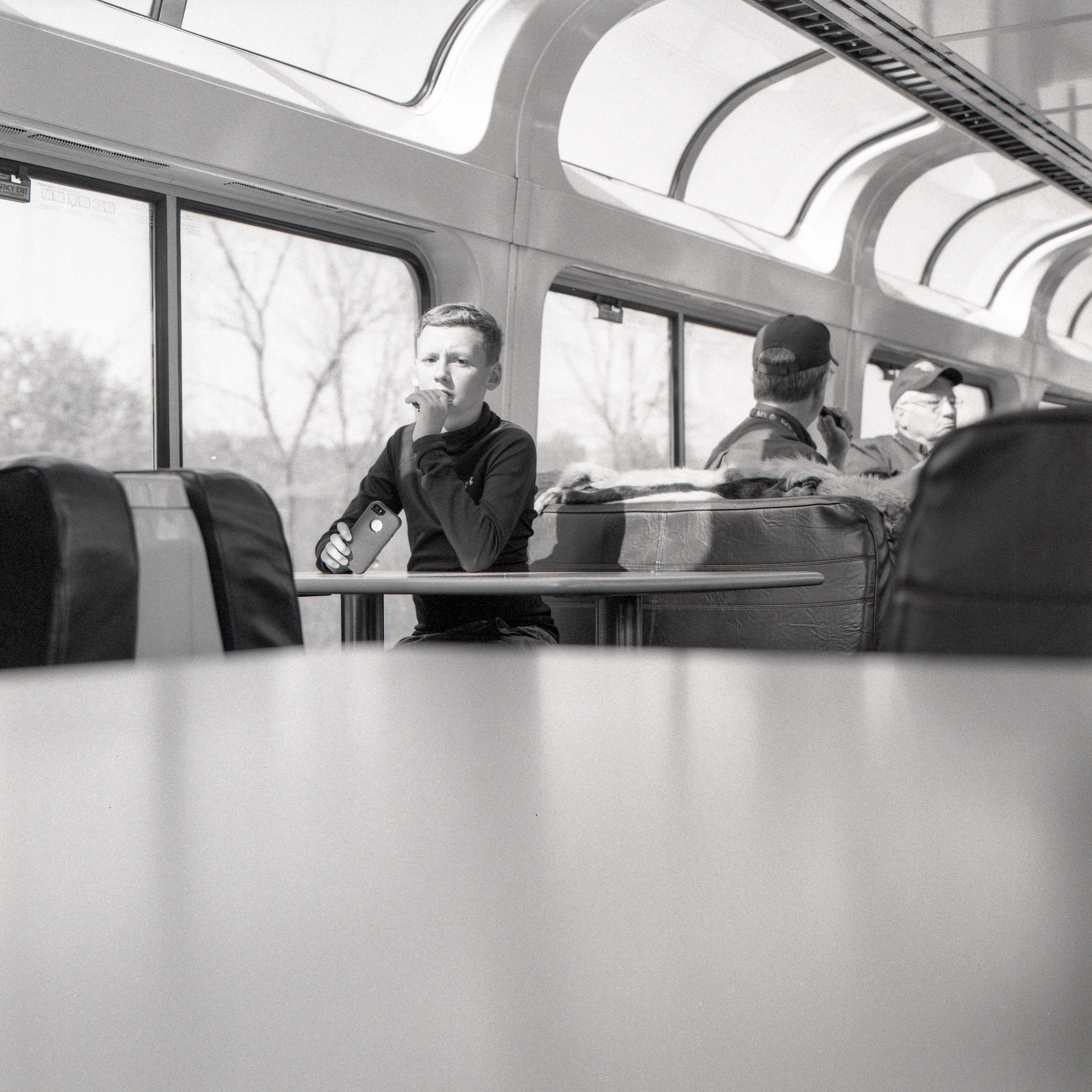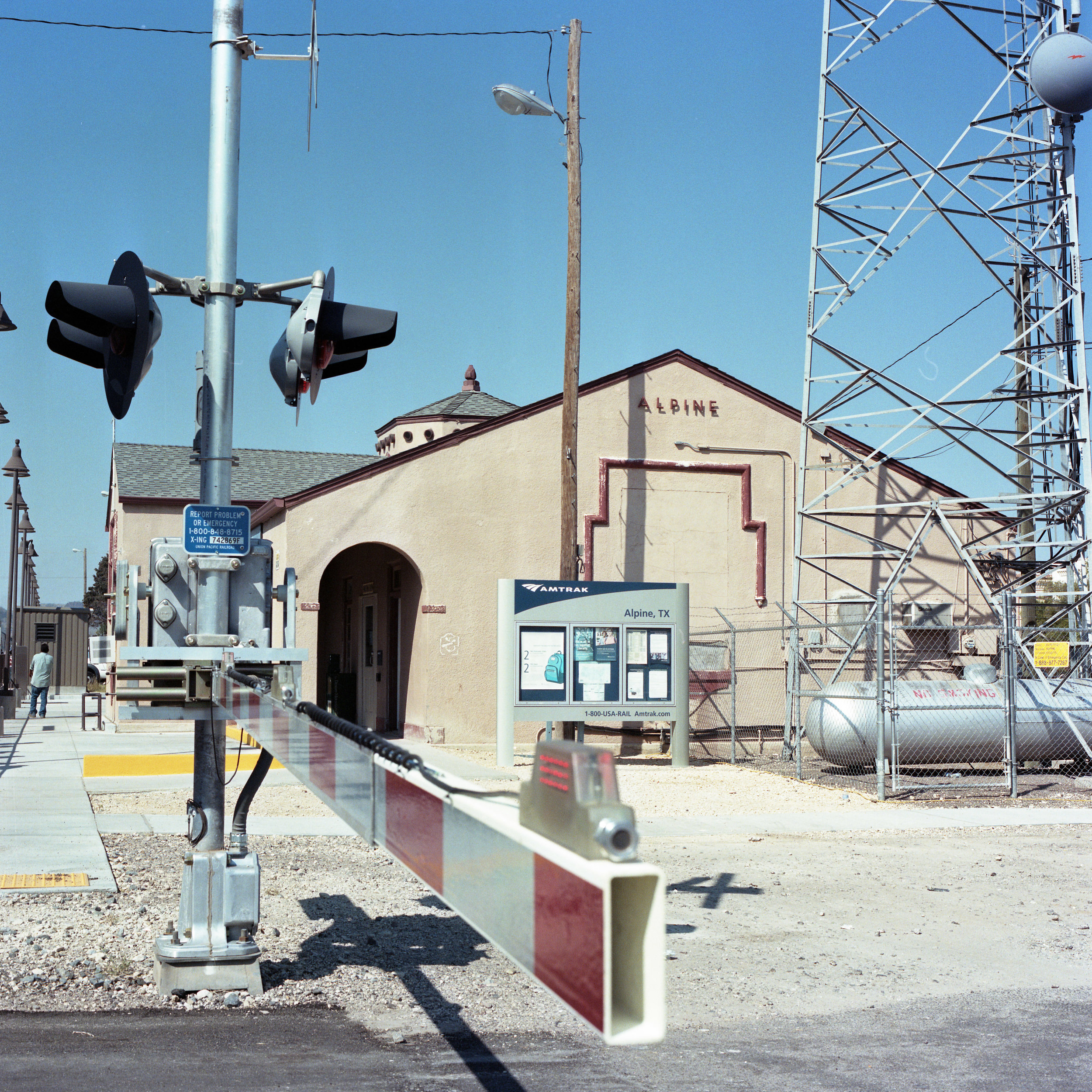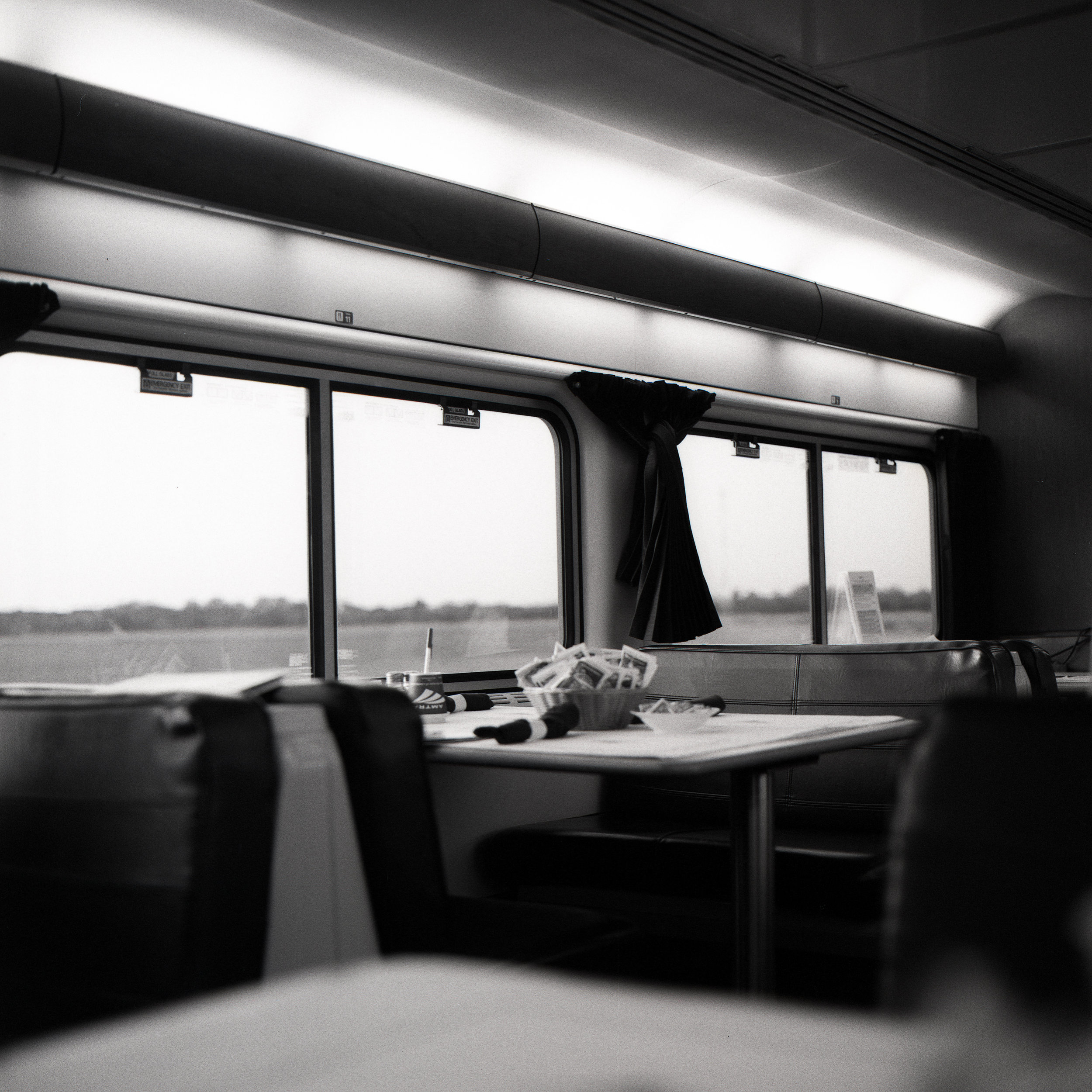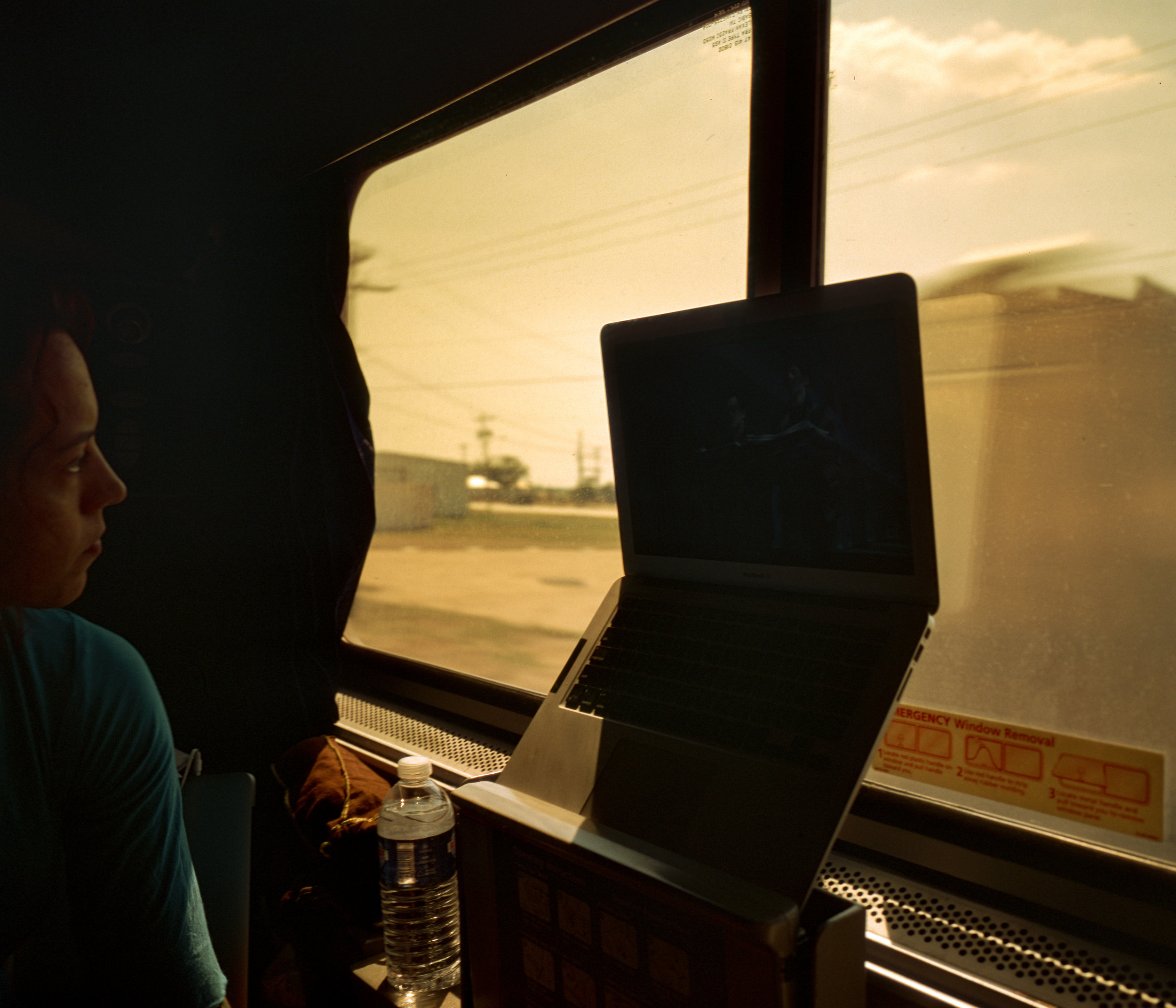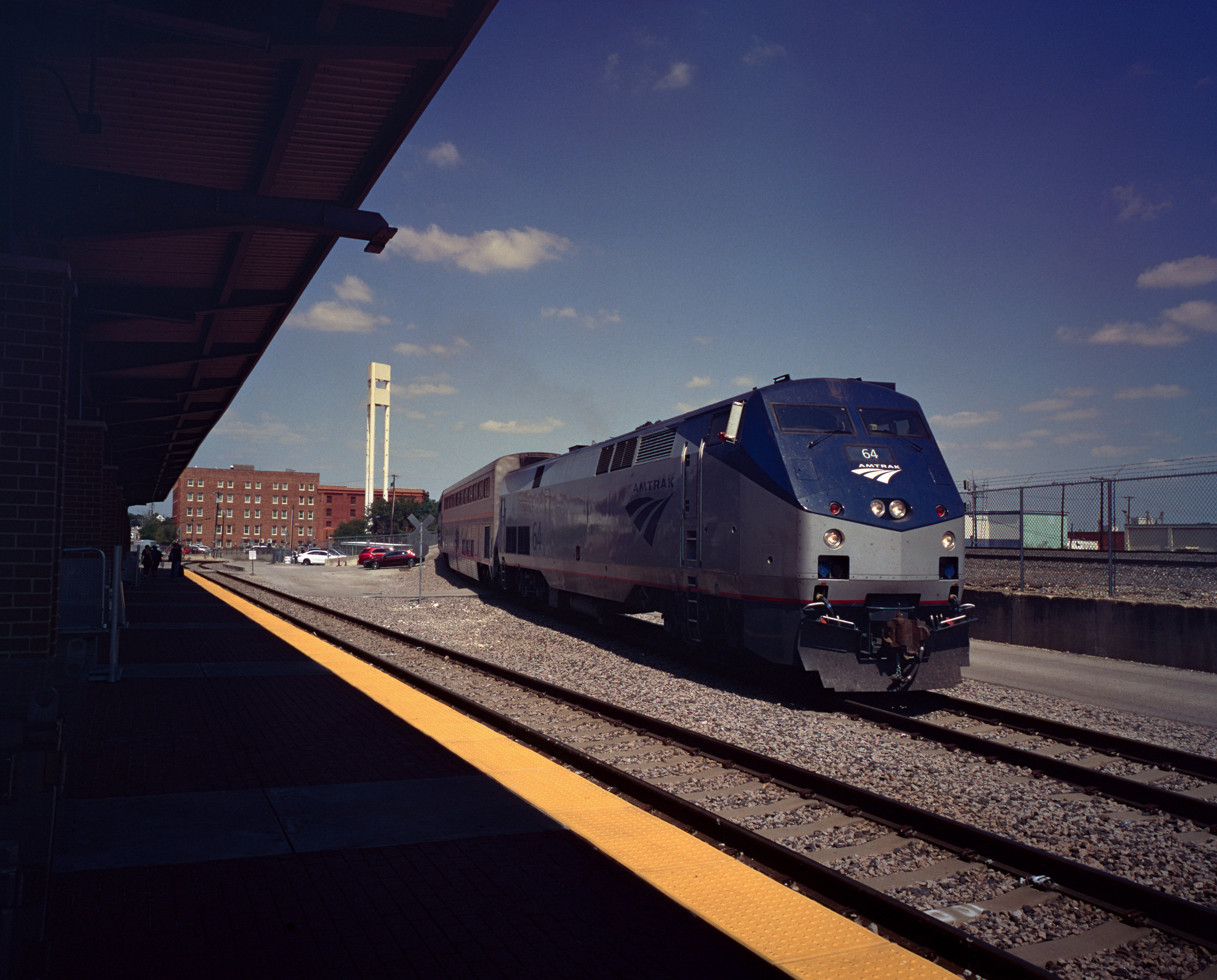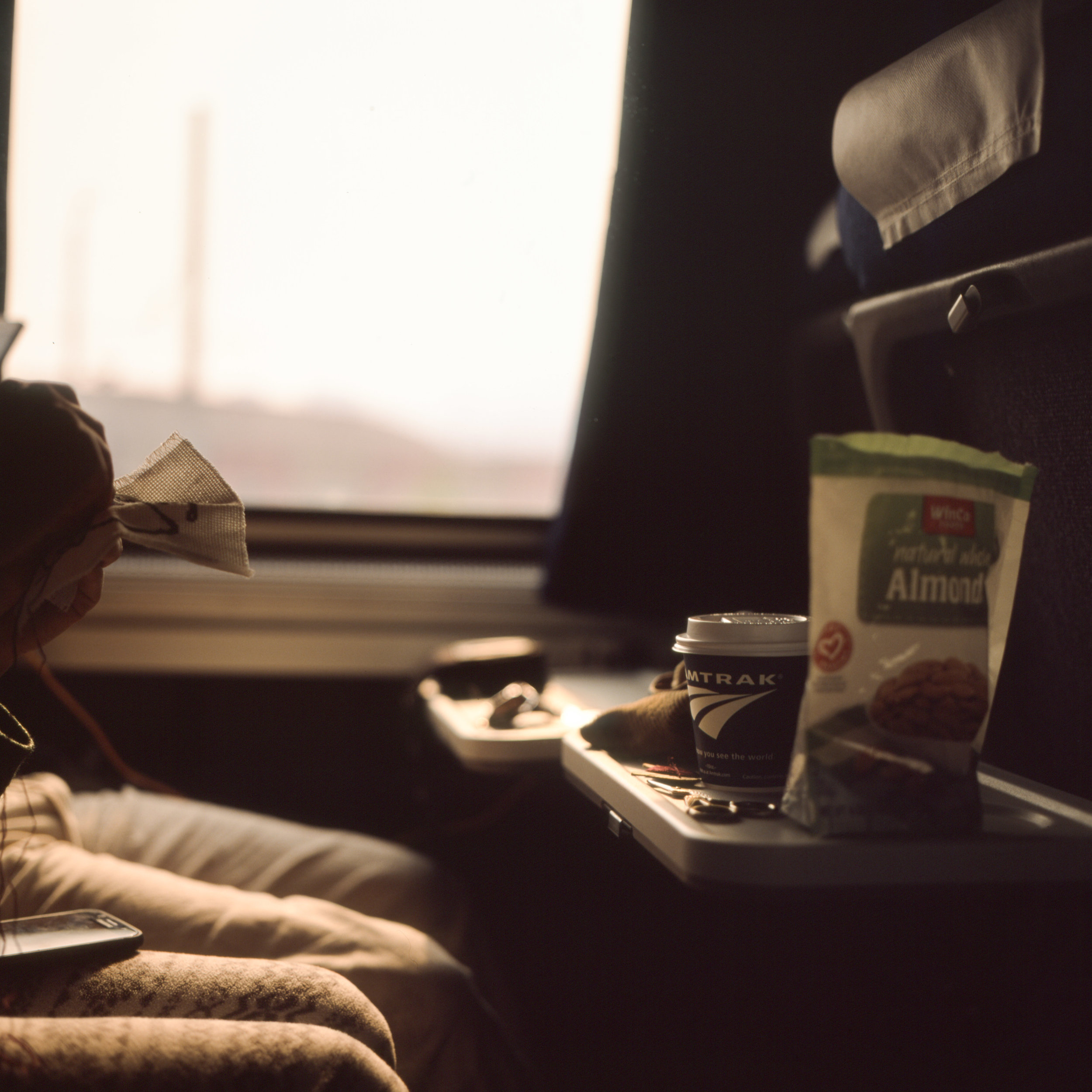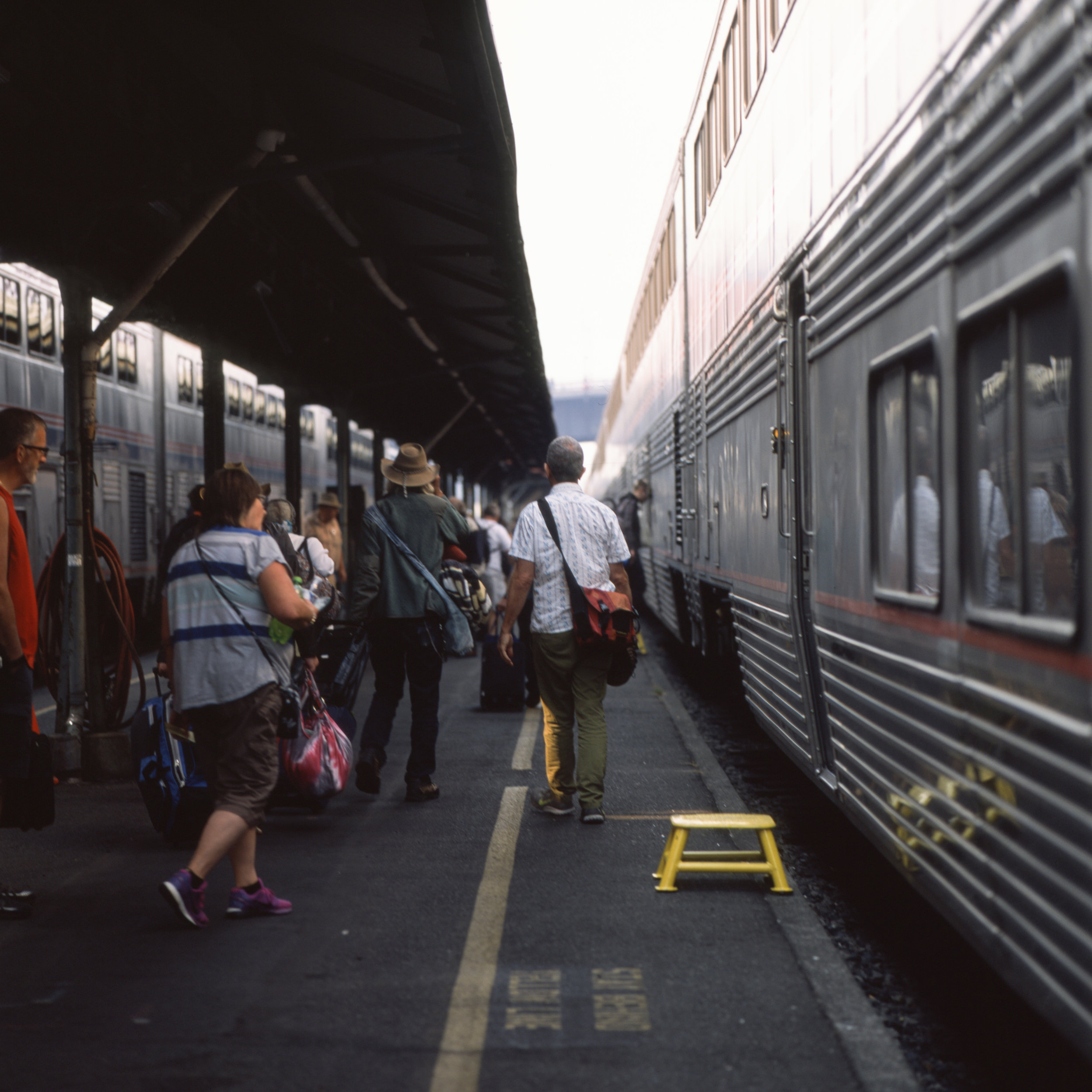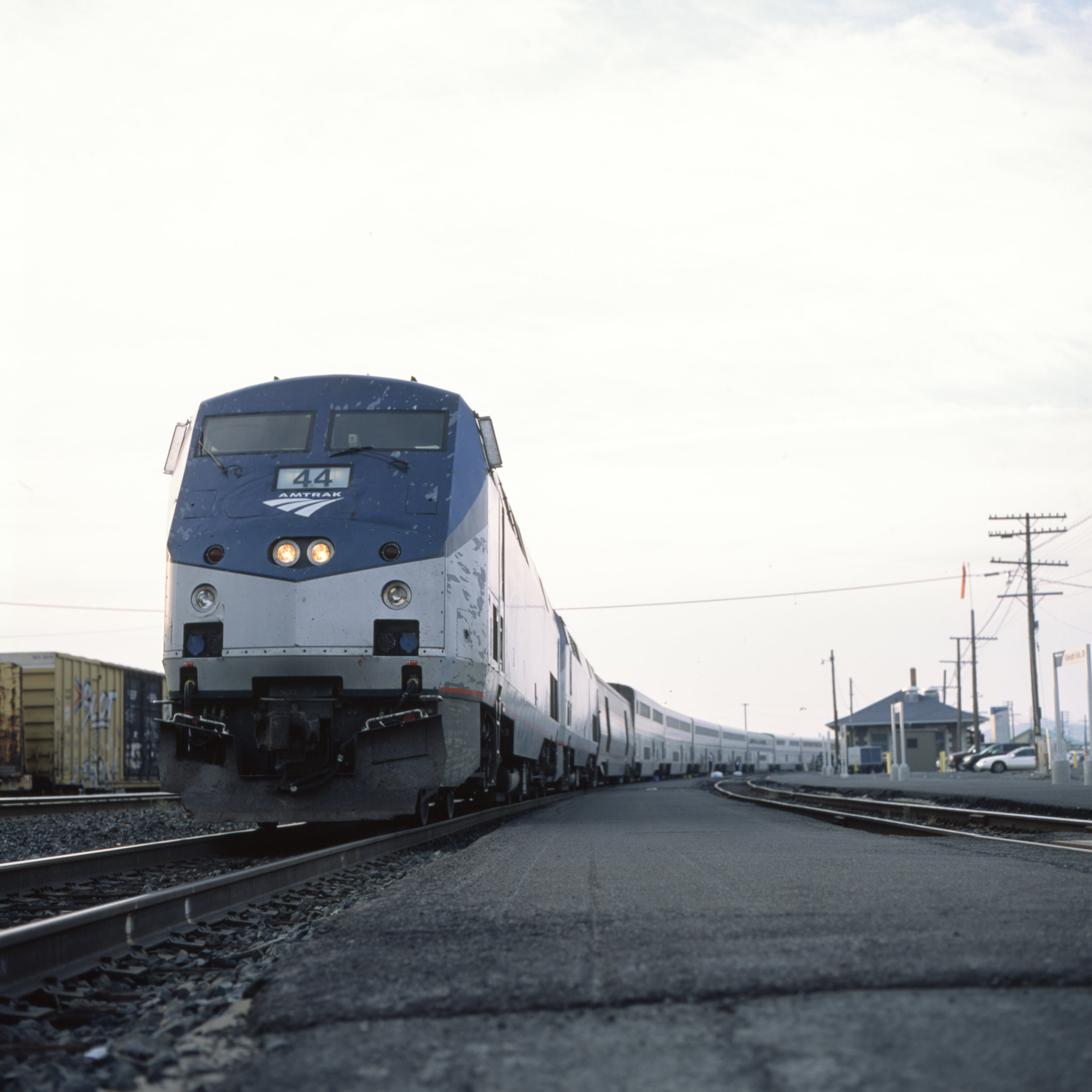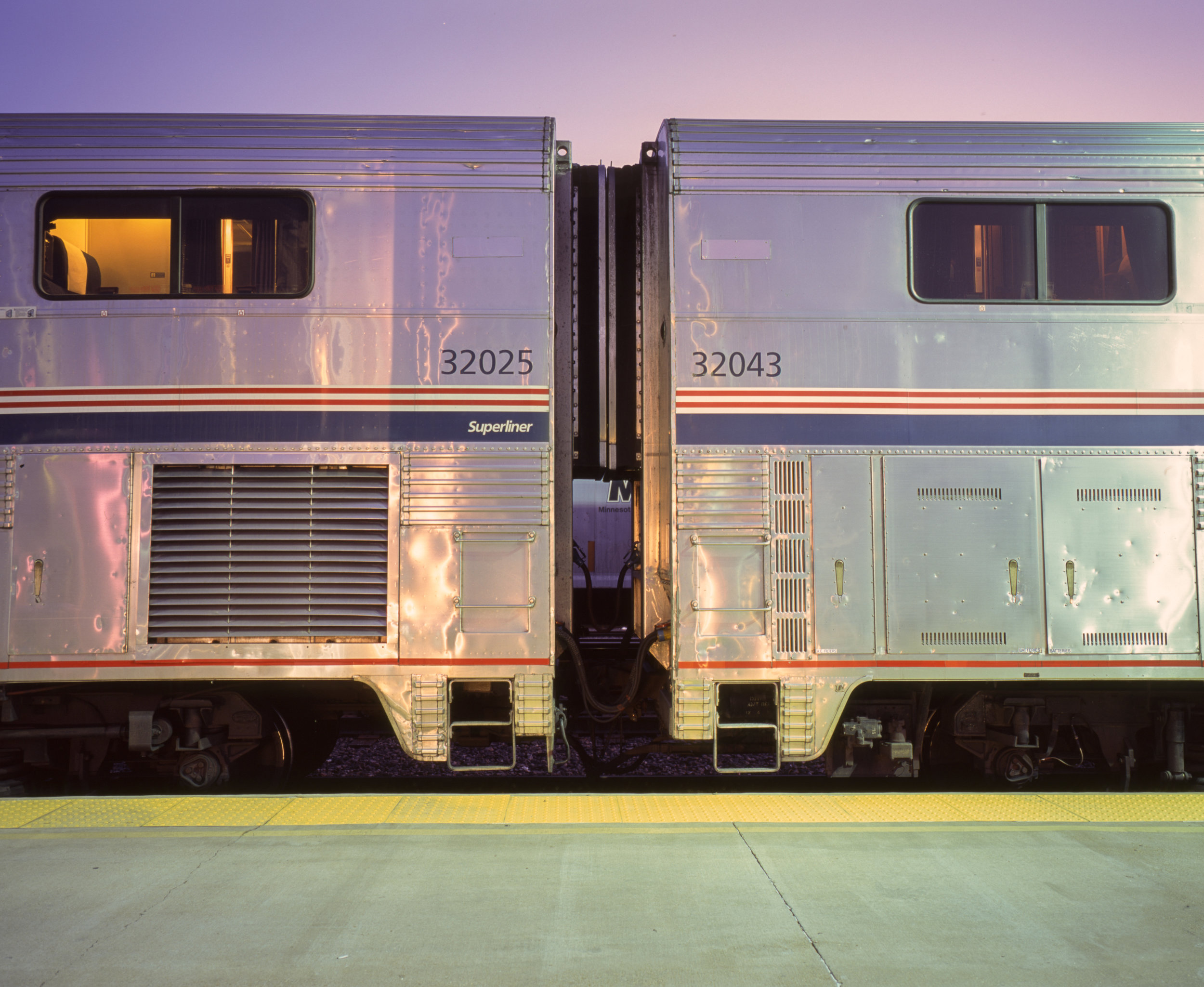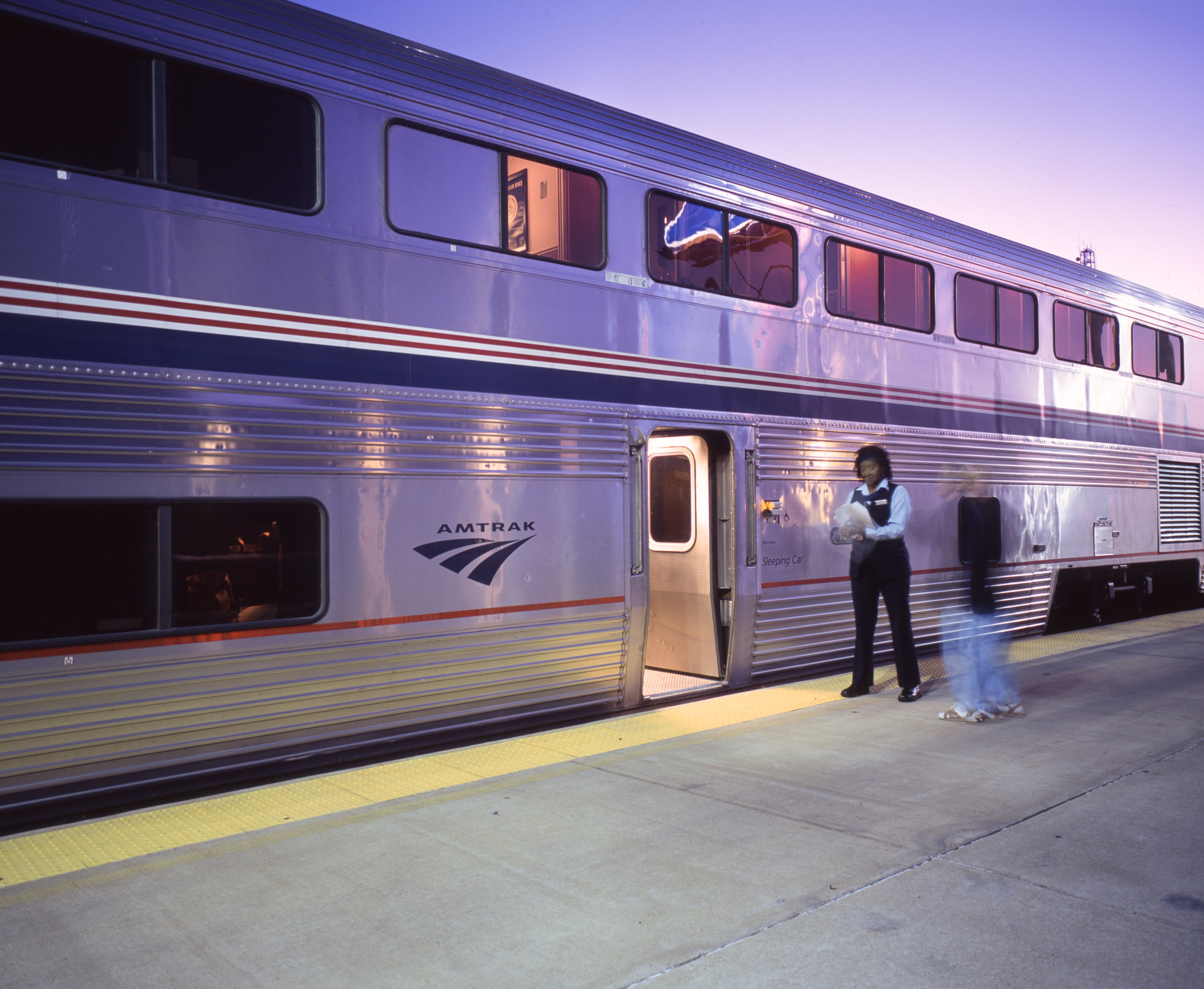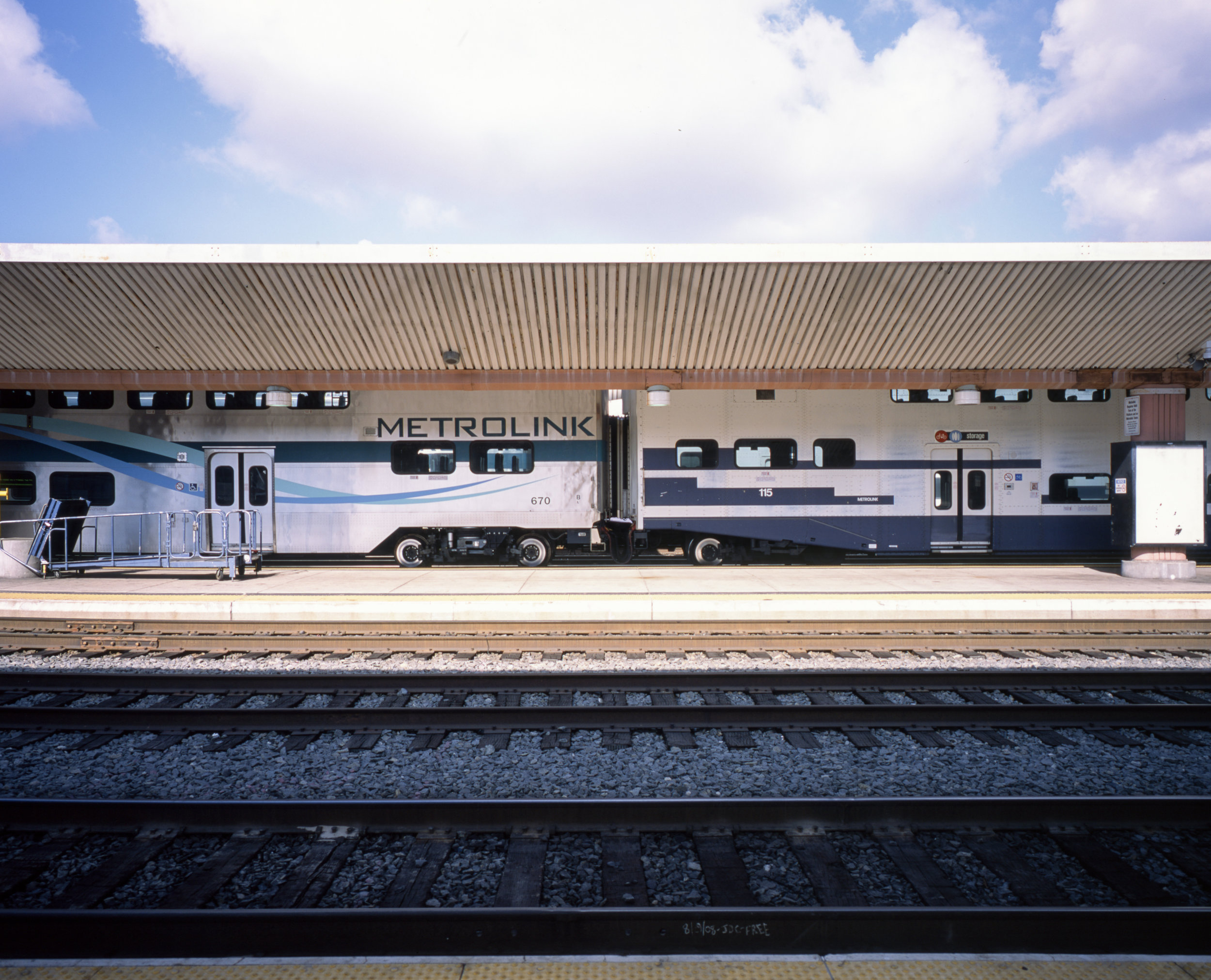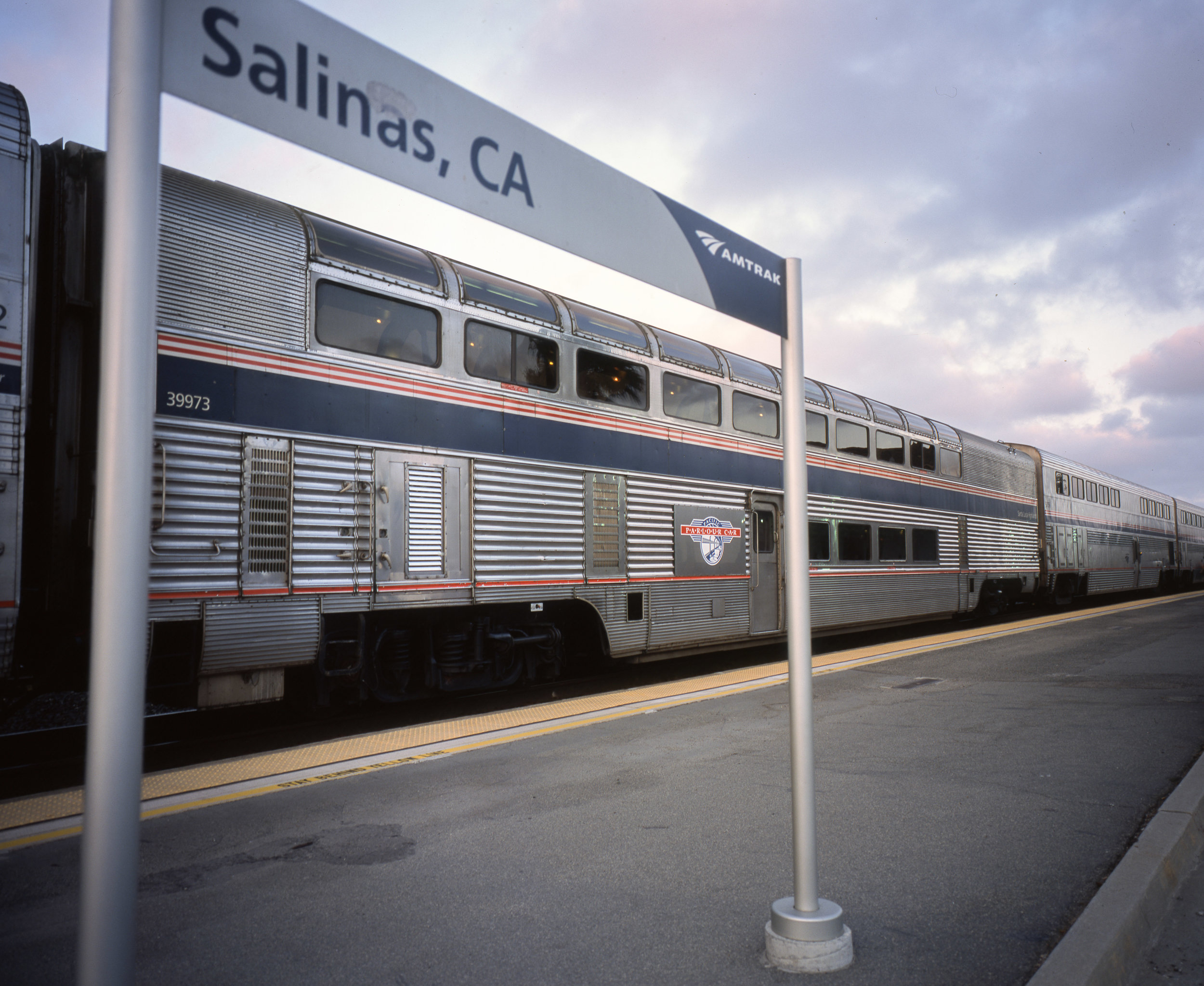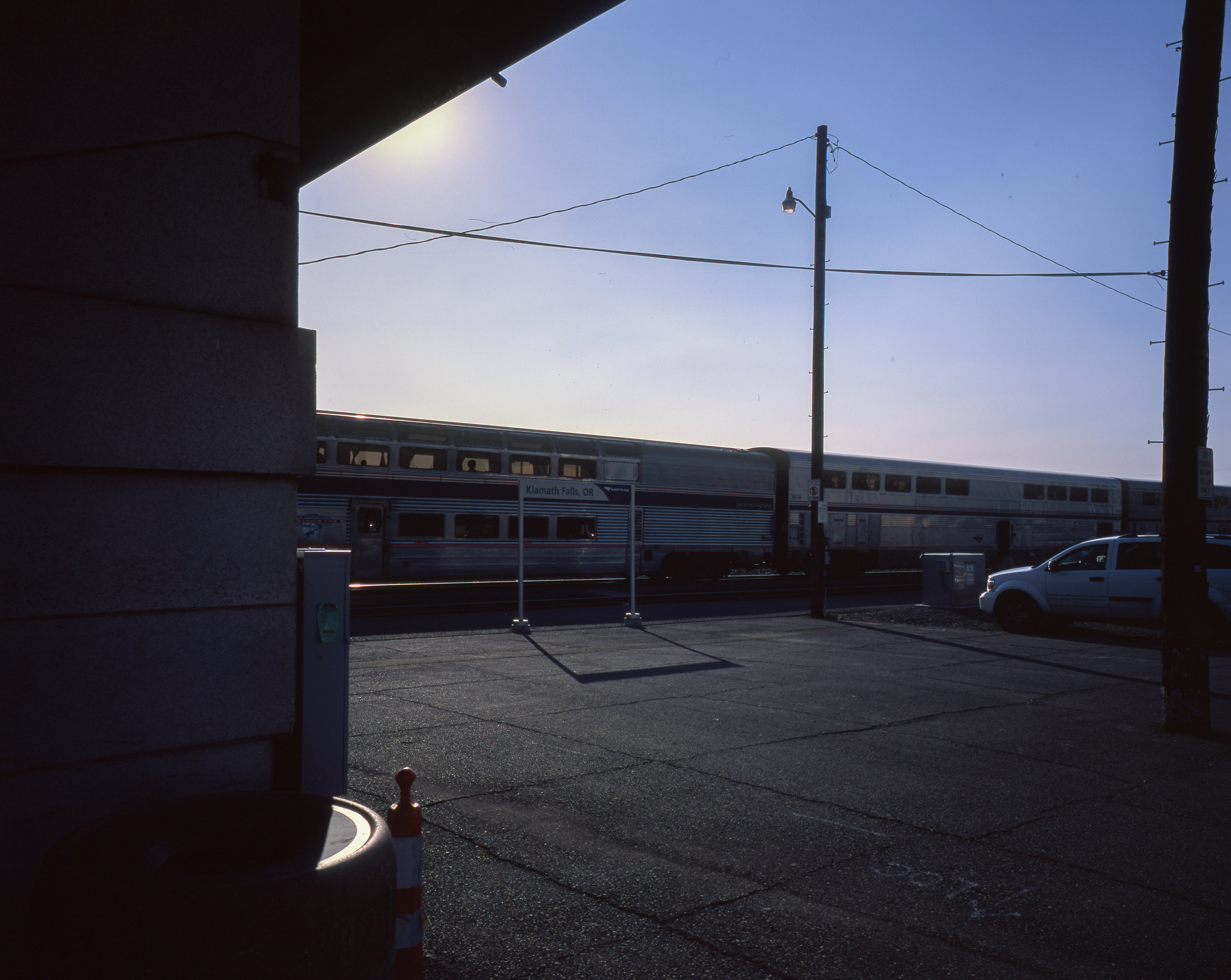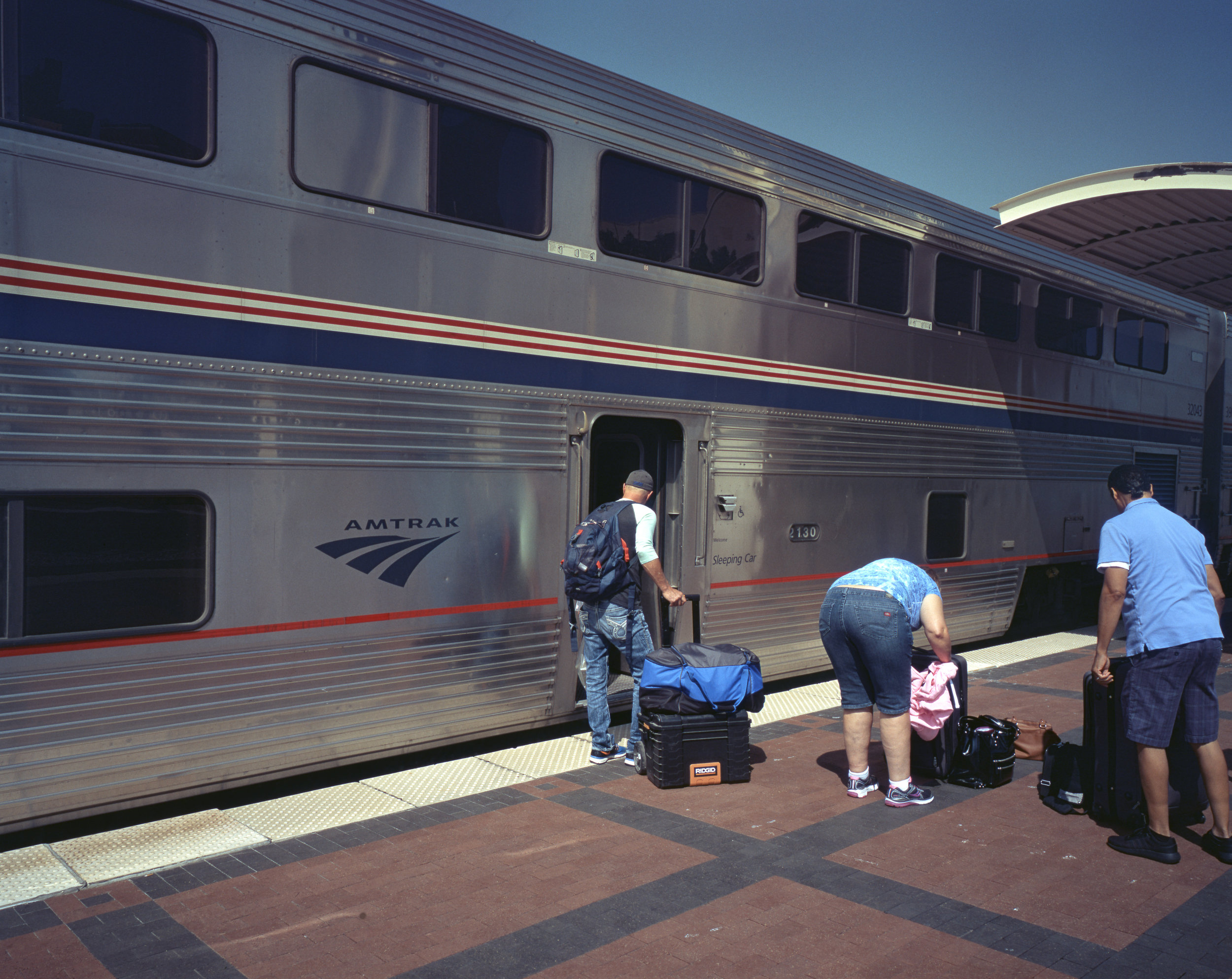Amtrak Coast to Coast: 2017
Getting off the Capital Limited in Chicago
Fuji GF670w | Fuji Provia 100f
Somewhere on the rails
Fuji GF670w | Fuji Provia 100f
Last year, Carmen and I decided to take our first cross-country Amtrak trip, California to Maryland. We have enjoyed train travel all over the world and it was, at the time, quite shocking to us we had never done it in the USA before. We had such a great time on this trip that when my dad contacted me about fishing in Alaska, I suggested we somehow incorporate another Amtrak trip into the Alaska trip.
One thing that both of us love is visiting our National Parks. Carmen had been wanting to visit Joshua Tree and Crater Lake at some point in the year; I thought this trip was a great chance to visit those as well. This is how our plan was finally formed. We were going to hop on the Crescent, train 19, from Baltimore to New Orleans, The Sunset Limited, train 1, from New Orleans to Los Angeles, and finally The Coast Starlight, train 14, from Los Angeles to Seattle. We would have one night in New Orleans, one whole day in Los Angeles where we would rent a car to visit Joshua Tree, and a full day's stop in Klamath Falls, Oregon to rent a car and visit Crater Lake. The final leg would be 12 hours to Seattle where we would part ways; Carmen would fly home, I would fly to Alaska.
Getting Started
We purchased our tickets for each train some months in advance for the Sunset Limited and the Coast Starlight. We waited to purchase the tickets for the Crescent as I wanted to take the train, Carmen wanted to fly to New Orleans to have a little more time in the city. In the end, I purchased our tickets for the Crescent with points I had from previous trips as well as from signing up for a new Amtrak Card from Bank of America. Everything looked good to go and we waited until September 9th to be on our way.
Like our last trip, there was a slight hiccup before we actually got going, while last year was my dog getting sick, this year it was two hurricanes that laid waste Texas and Lousiana. We watched the Amtrak site daily to see service updates, even going so far as to look at both UP and BNSF sites to see what was up and running and what was not. Our train, the Sunset Limited, was canceled on Thursday for our Sunday departure. Amtrak emails as well as texts for train updates, so I was on the phone immediately trying to change trains, because we had been looking at switching anyway, I knew what options were available to us. We could either leave a day later, so that we would get to LA for our reservations the day we had them or, we could take the longest train on Amtrak's system, the 65 hour Texas Eagle; we ended up on the Texas Eagle.
Amtrak was able to make the switch, honoring our price for the canceled train on our new train, which was awesome as the price usually is about double. We also had to switch from the Crescent to the Capital Limited to get to Chicago and meet up with our train.
Capital Limited
The Capital Limited is a train the runs from Washington DC to Chicago or the reverse. We had to get on a Marc train to get down to DC, which we did. We arrived in DC about two hours before our scheduled departure of 4:00 pm, which gave us time to get some lunch. We then headed to board the train, because we had a room we were diverted to the Amtrak Lounge, offered some snacks and drinks, then boarded before everyone else.
A group of nine people was taking the train all the way to the Grand Canyon and one person in their group, Barbara, was on a different car, so I offered to switch rooms with her so she could be closer to her group, they were very grateful.
Our room on this train was up top, which I originally thought would be better, but I found I prefer the lower level roommettes, there is more walking around room, you're closer to the bathrooms, and because there are fewer rooms and no reason to be downstairs except for the bathrooms, it tends to be more quiet downstairs.
The Lounge Car, the best place to hang out
Fuji GF670w | Kodak E200
The 17 hour and 40-minute train is not the most scenic or exciting train, most of which run at night, especially when the sun goes down earlier. We did cross Harper's Ferry and skirting the Potomac RIver for some of the ride. In addition to this, for part of the ride the Trails and Rails, a partnership with the National Parks, was on discussing the area. This was something I had not seen before but was impressed with it. National Park volunteers describe what you're seeing, things you are passing, and historical events in the area. They also have the National Parks passport stamps if you're into that sort of thing (I happen to be).
There was a smoke stop in Cumberland, Maryland and the ride from here on became dark, so I spent the rest of the ride in the room, either watching movies or sleeping. I will add that this was the worst sleep I had, being jostled awake quite a few times throughout this route. We were well into Indiana before I woke up, the sun being above the horizon for some time when I finally did wake up. We arrived in Chicago on time, and my friends, Jeffery and Bethanie as well as their son, met us at the station for our five-hour stopover in Chicago.
The Texas Eagle
After leaving our friends, we did get to spend some time in the lounge, which in Chicago is quite large. We spoke more with the group headed to the Grand Canyon before boarding our train. This train, which we would board in Chicago and disembark in Los Angeles, is actually two different trains. Amtrak does not consider this their longest train because only two cars from the consist leaving Chicago make it all the way to Los Angeles; these two cars are tacked onto the back of the Sunset Limited in San Antonio.
Trails and Rails volunteers somewhere south of Chicago
Fuji GF670w | Fuji Provia 100f
We boarded our train on time, our car was directly behind the baggage car, putting us only one car behind the engine. Our car attendant for this leg was Deborah, an Amtrak employee for over 15 years, she would be with us all the way to Fort Worth. She was extremely friendly.
On this route, there was also a group from the Trails and Rails program guiding us through most of what we were seeing from Chicago to Springfield. The two guys were, much like the other NPS volunteers, both knowledgeable and friendly. The train left Chicago shortly before 2:00 pm, which meant it was daylight from Chicago and all of Illinois; the sun set as we were pulling into St. Louis. The stop in St. Louis was a 30-minute smoke stop.
St Louis station
Fuji GF670w | Fuji Provia 100f
I quickly fell asleep after we departed St Louis, this ride was so much smoother than the previous night's ride. I did happen to get up randomly at Little Rock, another smoke stop, where I shot a few shots before getting back on the train and falling right back to sleep.
Most people on this train were getting off somewhere between Chicago and Dallas, with a few staying on to San Antonio. Hanging out quite a bit in the lounge car, I met several people with as many reasons for riding the train. One couple was taking the train to Austin, one gentleman goes to his son's games at Notre Dam and takes the train each time. I met an Army engineer who was taking the train for the first time, he loved it. We actually had a meal together, as well.
The man I spent most time on this route talking to was a gentleman who has ridden Amtrak since its inception. He was in Chicago or Washington DC for a passenger rail convention of some sort. He knew every mile of rail and described where we were, what was coming up, what was new and what was old. He was always there, a few rooms down, ready to chat me up in the vestibule or lounge car. I wish I had gotten his information so I could send him so postcards or prints. He really made my ride that much more fun.
Dallas Station
Fuji GF670w | Kodak E200 (really bad color shifts with this roll)
The morning on the Texas Eagle came as we entered Texas at Texarkana. I slept for a while after sunrise and woke up later down the line. Northern Texas was much different than I remember, very green. I was expecting more desert. I was fully awake, after breakfast of course, when we pulled into Dallas around noon. Our station stop here was a smoking stop, it also saw a handful of passengers leave and another handful get on. The stop was longer than I had initially expected, and it was hot. Dallas Amtrak station is also home to a Dart stop as well as a TRE stop, so there was plenty of good people watching around here. I will add that somewhere in here, a new, very Texan, conductor got on and checked everyone's ticket, something I haven't experienced before. He was stern and very rude, not the typical Amtrak experience I was used to. He departed in Fort Worth, luckily.
Our next major stop was Fort Worth, about an hour down the line. Another extended stop, this one longer than Dallas, allowed us to walk around Fort Worth for a time, get some cash at an ATM (for tips for the crew) as well as get Subway at the station.
At this station, our new car attendant got on as well, she would be replacing Debra in San Antonio, as Debra only does a Chicago to San Antonio. Our new lady took over at San Antonio and was with us until Los Angeles. She was friendly, if a bit more stern and not as cheery as Debra, she was just fine all the same. Leaving Fort Worth, about two hours after our arrival, was a smooth transition onward.
Between Fort Worth and San Antonio, the scenery was much the same and the ride was, too. We pulled in to San Antonio on time and decided to hang out in our car for the time being, just to avoid the hustle and bustle of others getting off. In San Antonio, our car, as well as one coach car, were removed from the Texas Eagle and put on the tail end of the Sunset Limited to continue onward to Los Angeles. While the ride from Chicago to Los Angles is 65 hours and is technically the longest, because it consists of two trains, it is not. The honor of the longest Amtrak route goes to the California Zephyr.
Our new engine at San Antonio
Hasselblad 501cm | Kodak Portra 400
We did eventually get off the train in the hopes of shooting some night photos of our train, however, as the Amtrak station in San Antonio is, apparently, privately owned, their security informed us that we were not allowed to use a tripod. This made me quite mad, and after a phone call to Amtrak, I found out the security was correct. We did have another talk with the security guard, and I apologized for being rude (always apologize when you're wrong and rude). I was able to take some photos of the train from a public road, though. San Antonio also has a river walk that was a short stroll from our train, which we walked down to. If you're doing this route, I'd suggest it as a great way to kill some time.
Through the desert
Fuji GF670w | Fuji Velvia 50
El Paso
Fuji GF670w | Kodak Portra 400
After all that, we got back on the train to go to sleep, only to be woken up by the jostling of cars to make up our new train. I was able to get back to sleep sometime in the midst of the jostling and woke up to peak out as we were departing San Antonio. I woke up sometime in the desert, the Texas landscape I was most excited to see. Between San Antonio and El Paso, the route was baren with lots of rail between towns, one notable exception was the Marfa Prada which we were able to see outside our window and we flew through the desert at 80mph.
El Paso was a longer station stop, I believe somewhere in the neighborhood of 45 minutes. It was hot, too. One guy, who had his kids with him and was riding in coach, had Domino's deliver a pizza to him at the train station, which was pretty funny. One really cool thing about this part of the ride is, Mexico is about half a mile from the station, and at some points, about 20 feet from the train as you follow the border out of town and into New Mexico. I spent a lot of the time in this ride speaking with the older guy in the vestibule, talking about what we were passing, including a massive new rail yard that spanned miles and as far as the eye could see.
Desert Views
Fuji GF670w | Kodak Portra 400
Nightfall came sometime in Arizona and the last stop I got off at before falling asleep was Tucson. A lengthy stop and two rolls of film later I bedded down for our last night on the Texas Eagle/Sunset Limited. Los Angles was an early morning end to our train, around 5:30. We had a big day at Joshua Tree that day, so I wanted to get as much sleep as I could. We did arrive on time to Los Angeles, by the way.
Desert Sunset
Fuji GF670w | Kodak Portra 400
The Coast Starlight
We had an amazing time in Los Angeles and Joshua Tree but were ready to get back on the train for our final route of this trip, the Coast Starlight. The Coast Starlight runs from Los Angeles to Seattle, and like the previous two routes, we would be riding from beginning to end, we did, however, have one stop in Klamath Falls for Crater Lake.
Lunch along the Pacific Ocean
Fuji GF670w | Fuji Velvia 50
Salinas from the Parlor Car
Fuji GF670w | Fuji Velvia 50
Leaving Los Angeles and getting on the way has, what many consider to be, the most beautiful section of rail in the country. The train skirts the beach north of the city for quite some time. I have heard this for years, just how spectacular this ride is, I was not let down. The train is feet from the beach at some points, and 50 feet above the water on cliffsides at others. My only complaint is, I thought that the beach going part of the ride would be longer, but the train eventually makes its way back inland, leaving the beach behind. We, luckily enough, had a room on the west side of the train, so we were right up against the coast.
We met a couple for our lunch on the first day who were taking the train from Arizona to Seattle, in Seattle they would be taking an Alaska cruise. Later on the ride, there was another couple doing the exact same thing. This is a great and relaxing way to get to your cruise, avoiding the hassle of airports.
After the coast, Central California was mostly agricultural, passing through Santa Ynez and Salinas Valleys, Paso Robles, and Salinas to name a few. There were a lot of different crops being grown here, from vegetables and lettuce to trees of different varieties. This type of scenic viewpoint, to me, is just as exciting as the mountains on the Zephyr or the Blue Ridge on the Cardinal; it is different and unique. A lot of this ride, during the day especially, was spent in the parlor car.
Observation Car at night
Fuji GF670w | Fuji Provia 100f
Parlor Car
Fuji GF670w | Kodak Portra 400
The Coast Starlight has a parlor car, a nicer version of the lounge car, with padded swivel chairs, nicer booths, and meal service if you make the appropriate accommodations. This car is reserved for sleeping car passengers only, so the people here are a bit different than those in the lounge car, less trash is left, seats aren't slept across, things of this nature do not happen up here. The lounge car also has free wifi, that is a big plus.
Night fell as we approached Gilroy, which is about 100 miles south of San Francisco, or in our case, Oakland. We had dinner with a wonderful couple from San Francisco, older people, according to them, middle-aged if you actually looked at them. They were headed home from Southern California where they saw their son. They will actually be in India when we will be, hopefully, we will run into them while we are there.
After passing through Jack London Square in Oakland, where the train runs in the middle of the street for a few blocks, something I had wanted to see, I went to bed. When I woke up, we were in Northern California, passing through the amazing forests that I associate with the West Coast. I had breakfast as we snaked along the winding tracks at a slow speed. Klamath Falls was just across the Oregon border, so I was not awake too long before we had to collect our things and get off the train. We stopped in Klamath Falls to visit Crater Lake, a place deserving of its own post.
Back on the Coast Starlight
We got back on the Coast Starlight the next day for the final 12-hour leg of our journey; this is also the only section we opted to not get a room. We figured because this whole trip was during the day, the extra cost for a room would be better saved and just purchased a seat. Upon boarding, I immediately regretted this choice. After the first hour or so, we realized this choice was just fine. Our car was the last car on the train again, and we were placed somewhere closer to the front of the car in two comfy chairs.
Through the Willamette Valley
Fuji GF670w | Fuji Velvia 50
Exiting Klamath Falls and heading into Willamette Valley is absolutely amazing, and likely my favorite section of the whole trip. Skirting the mountainsides, crossing bridges that lead into tunnels in the mountainside was stunning. I was not able to properly capture this, the trees were so close to the train.
After the forest area, the ride was much like others and not worth mentioning. I spent time watching movies. We did have a 30 minute stop in Portland, where I got off and walked around the station. I finally saw the Cascade trains, which is a service that only exists in the Pacific Northwest. It even has its own dedicated train sets. The ride into Portland was extremely slow, owing to the older bridge we had to cross to get into the city.
Leaving Portland, the train follows the Columbia River for some time, the train also had NPS Rails and Trails guys for this part of the ride, so I sat and listened to them for a while. After this, the ride was uneventful until we reached the bottom of the Puget Sound, which is around Olympia. This, however, coincided with the sunset, which was beautiful but meant we were not able to see anything after that. Apparently, Mt Ranier is visible from the train as well, but we were unable to see it because of the wildfires.
The last stop, Seattle
Fuji GF670w | Ilford HP5
We pulled into Seattle on time, our longest Amtrak trip to date finished; all together, the three train routes are right around 4000 miles. The trip was amazing, we passed every type of landscape the US has to offer, from the mountains and redwoods in Oregon and California, the ocean and coast in Southern California, the vast and uninhabited desert of the southwest, cornfields as far as the eye can see in Illinois, and the densely packed urban landscape of the east. We did have to change some plans because of the hurricanes, however, Amtrak handled this well, which was a load off our minds. I can't wait to take our next trip, maybe New York to Seattle on the Lakeshore Limited and the Empire Builder. Either way, whenever we take a train trip again, I know it won't be soon enough.
